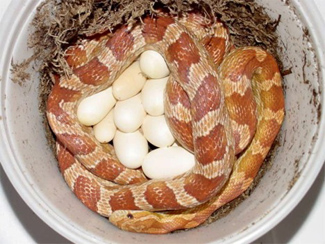It’s OK To Lay But Bad To Bind: Egg Binding in Birds and Reptiles
It’s that time of year again. Hormones are raging, and animals everywhere are getting ready to mate. Spring time is a time of birth – flowers are sprouting new buds, mammals are courting each other, and birds and reptiles are getting ready to lay eggs. All of this happens as usual in nature, where food is plentiful and sunlight is bright. This is not always the case in our households, though.
While it is more common for egg-laying animals to follow seasonal cues to breed, such as longer day length, warmer temperatures, and more plentiful food sources, pet birds and reptiles don’t always follow these rules. Pets are generally maintained under unchanging temperature and light conditions in our homes and usually have the same access to food regardless of the time of year. Thus, pet birds and reptiles sometimes lay eggs during the non-breeding season, unlike their wild counterparts.

Each of these different causes of egg binding is treated differently. To help the animal lay, some egg-bound pets merely require supportive care, such as fluids underneath the skin to rehydrate them if they haven’t been eating, a calcium injection if they haven’t been getting adequate calcium in their diet, or supplemental vitamin D if they have not been exposed to direct ultraviolet light. In more complicated cases, such as when there is a physical obstruction within the oviduct, preventing the egg from passing, the egg may need to be surgically removed – a procedure that can involve great risk and frequently great expense due to the often difficult nature of the surgery.
Since egg binding can be life threatening, bird and exotic pet owners must do everything they can to try to prevent this condition from happening. Both birds and reptiles need to be fed complete diets containing all the nutrients in the proper proportions to meet the additional demands that egg laying plays on the body. Since different species of birds and reptiles have different nutritional requirements, owners of these pets should consult with bird and reptile-savvy veterinarians to get the most up-to-date recommendations regarding feeding. Birds and most reptiles also require direct UV light, unfiltered by window glass, to produce adequate vitamin D. Birds should not be encouraged to lay; they should not be given access to small places (like closets or cabinets or underneath beds) where they can build nests. Owners should touch birds only on their heads, not on their bodies, so that they don’t send confusing quasi-sexual messages to their pets, and they should remove all mirrored toys from their birds’ cages so as not to make the birds think that they have mates.
Unlike with birds, with reptiles, interaction with and behavioral cues from owners plays less of a part in determining whether to lay eggs, and it is harder to deter egg-laying in reptiles than it is in birds. If a reptile starts to show signs of egg-laying (swollen body, decreased appetite, burrowing), they should be given a place with appropriate nesting material to dig and lay. In addition, they should be kept at species-specific optimal temperatures, so that if they decide to lay, conditions are perfect for them to do so. Egg-laying is a natural behavior that both birds and reptiles everywhere demonstrate. Owners of these animals should not be afraid if their pets display egg-laying behavior. The trick is for owners to educate themselves about their pets’ needs, both during non-breeding times and during these animals’ reproductive cycles, to try to prevent egg-binding from developing if egg-laying occurs.
Recent Posts
Tips for Winterizing Your Reptile
By Dr. Laurie Hess When cold weather comes, especially in areas that experience significant climate changes as…
Did You Know That Turtles Shed?
People are sometimes surprised by this question but, like other reptiles, turtles DO shed! While snakes regularly…
Do Ferrets Need Vaccines?
Few of the exotic pet species that we see at The Veterinary Center require vaccinations, but ferrets…
Lead Toxicity in Exotic Pets
Have You Heard About Lead Toxicity? Exposure to lead and other heavy metals can affect multiple body…
Importance of Hydration in Westchester County, NY
With summer temperatures approaching, water is especially essential to your pet’s health. Hydration is needed to regulate…
About Veterinary Centers for Birds and Exotics
If you have been looking for specialized care for your bird or exotic pet, look no further! We have you covered. At our unique animal hospital, we provide care to birds and exotics ONLY—no cats and dogs! We are the only bird and exotic veterinary hospital with a full-time, board certified bird specialist, Dr. Laurie Hess. Dr. Hess, who, with her two associates, Dr. Amanda Marino and Dr. Amanda Dewey, are the only full-time veterinarians in Westchester County who are residency-trained in bird and exotic medicine and surgery. Call to schedule an appointment for your pet!

